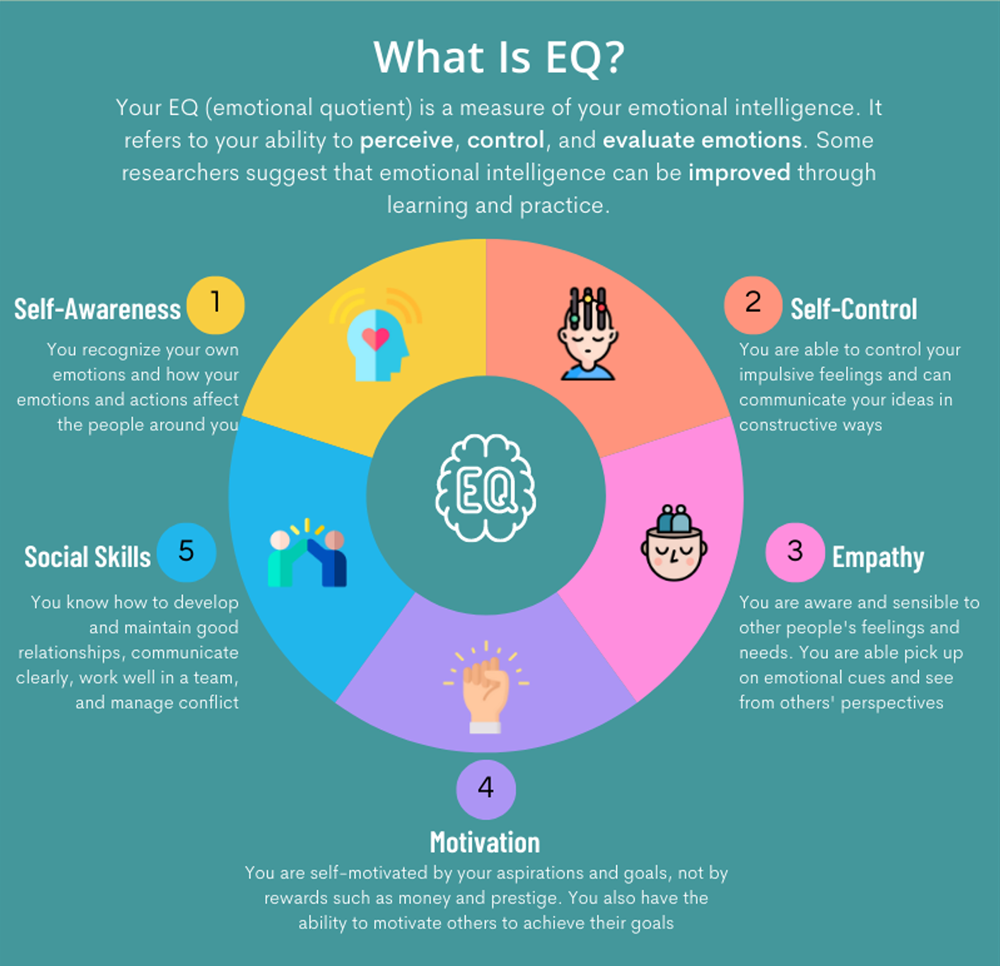Supporting Emotional Intelligence in Children with Dyslexia
The Importance of EQ for Dyslexic Children
Raising a child with dyslexia or reading difficulties can be an emotional challenge, but understanding and nurturing their emotional quotient can make a significant difference. The infographic “What is EQ?” outlines five key components—self-awareness, self-control, empathy, motivation, and social skills—that form the foundation of emotional intelligence. For parents of dyslexic children or those struggling with reading, these elements can be powerful tools to foster resilience, improve learning outcomes, and build confidence.
Source Item: https://onlinemeditationevents.com/blog/the-eq-era-how-to-improve-your-eq-for-success-and-leadership/
Building Self-Awareness and Self-Control
Self-awareness allows children to recognize their emotions—such as anxiety during reading tasks—and understand how their reactions impact others. For a dyslexic child, this might mean acknowledging frustration and seeking support rather than withdrawing. Self-control, the ability to manage impulsive feelings, helps them channel this frustration into constructive actions, like asking for a break or using a reading aid. Parents can support this by modeling calm responses and encouraging reflective discussions about feelings, laying the groundwork for emotional regulation.
Author Quote
“Emotional intelligence is a transformative asset for children with dyslexia or reading difficulties.
” Fostering Empathy and Motivation
Empathy enables children to connect with peers by understanding their perspectives, reducing feelings of isolation that can accompany reading struggles. For instance, a child who picks up on a friend’s encouragement can feel supported rather than judged. Motivation, driven by internal aspirations rather than external rewards, is key for sustained effort in reading practice. The infographic notes that self-motivation, combined with the ability to inspire others, can propel a child forward. Parents can nurture this by linking reading goals to personal interests and celebrating effort, aligning with a growth mindset that values progress over perfection.
Enhancing Social Skills
Social skills are essential for dyslexic children who may feel self-conscious in group settings, such as reading aloud in class. The infographic emphasizes developing relationships, communicating clearly, working in teams, and managing conflict—skills that can boost confidence and peer acceptance. Activities like group storytelling or collaborative projects can help, allowing children to shine in non-reading contexts. Parents can facilitate these opportunities, helping their child build a supportive social network that reinforces emotional growth.
Key Takeaways:
1Emotional Foundation: Emotional quotient boosts resilience in dyslexic children.
2Self-Management: Self-awareness and control help kids handle reading frustration.
3Social Growth: Empathy and social skills build confidence and peer support.
Practical Strategies for Parents
- Encourage Self-Reflection: Ask your child how they feel about reading tasks to build self-awareness.
- Teach Coping Techniques: Use breathing exercises to enhance self-control during frustration.
- Promote Empathy: Role-play scenarios to help them understand others’ emotions.
- Set Intrinsic Goals: Focus on personal growth rather than grades to boost motivation.
- Facilitate Social Interaction: Arrange team activities to strengthen social skills.
Emotional intelligence, as outlined in the EQ infographic, is a transformative asset for children with dyslexia or reading difficulties. By cultivating self-awareness, self-control, empathy, motivation, and social skills, parents can help their children navigate emotional challenges and thrive academically. Drawing from the principles of LearningSuccess.ai, this approach empowers kids to turn reading struggles into opportunities for growth and connection.
Author Quote
“Self-motivation, combined with the ability to inspire others, can propel a child forward.
” The shadow of reading frustration threatens to dim your child’s potential, but with the uplifting values of resilience, empathy, and growth, you can banish this darkness. The Learning Success all access plan equips you with the tools to turn challenges into triumphs, fostering emotional strength and academic progress. Take the challenge today—join the program and empower your child’s journey!

